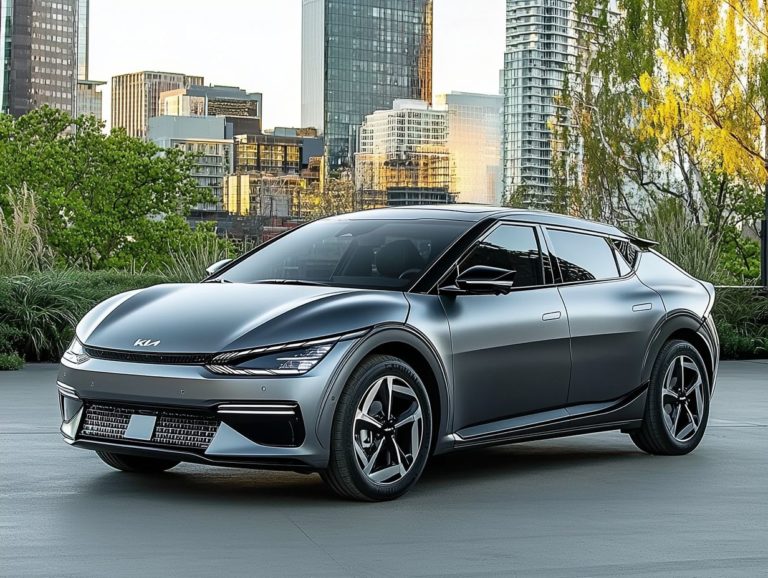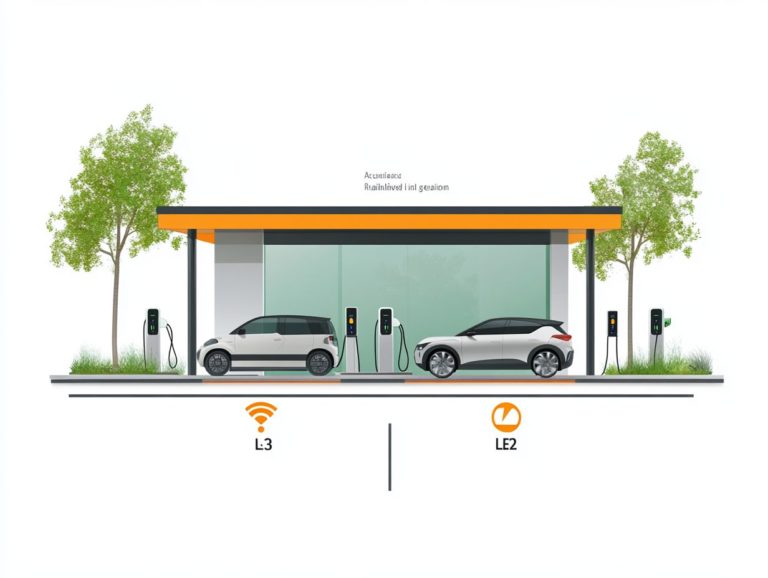The Impact of Electric Vehicles on Insurance Costs
As electric vehicles (EVs) gain traction, they’re reshaping the automotive landscape and revolutionizing the insurance industry.
With their distinct features, EVs present exciting opportunities and notable challenges regarding insurance coverage and costs. This article explores how the rise of electric vehicles influences insurance rates, comparing them to traditional cars while highlighting potential savings and additional coverage options available for you as an EV owner.
You’ll also discover the specific risks tied to insuring EVs and what the future holds for insurance in this dynamic market. Join us on this exciting journey as we uncover the key connections between electric vehicles and insurance!
Contents
- Key Takeaways:
- Impact on Insurance Costs
- Comparison to Traditional Vehicles
- Benefits of Insuring an Electric Vehicle
- Potential Cost Savings
- Additional Coverage Options
- Challenges for Insuring Electric Vehicles
- Future Outlook for Electric Vehicles and Insurance
- Frequently Asked Questions
- What is the impact of electric vehicles on insurance costs?
- Are there any benefits to insuring an electric vehicle?
- Do electric vehicles have higher insurance rates than traditional gasoline vehicles?
- How can I save on insurance costs for my electric vehicle?
- Will my current insurance policy cover an electric vehicle?
- Are there any future changes expected for insurance costs for electric vehicles?
Key Takeaways:

- Electric vehicles often save you money on insurance premiums due to their lower risk of accidents and repair costs.
- Insuring an electric vehicle often includes unique coverage options, such as coverage for charging equipment and battery replacement.
- However, insuring electric vehicles also comes with unique considerations and risks, such as the potential for higher repair costs due to specialized technology.
What are Electric Vehicles?
Electric vehicles (EVs) represent a revolutionary leap in automotive technology, specifically crafted to shrink your carbon footprint by employing electric motors instead of conventional combustion engines. Models like the Tesla Model S, Ford Mustang Mach-E, Porsche Taycan, Audi E-Tron, BMW i3, and Hyundai Ioniq exemplify the innovation and efficiency that modern EVs introduce to the automotive world, offering you cleaner alternatives to gas-powered vehicles.
This transformative technology works by converting electrical energy stored in batteries into motion, optimizing energy consumption and minimizing waste. When you compare EVs to their gas-powered counterparts, the benefits become clear: lower operating costs and reduced maintenance demands, along with the complete absence of harmful tailpipe emissions.
Thanks to advancements in a type of rechargeable battery commonly used in electric vehicles, the way these vehicles store and manage energy has dramatically changed, leading to increased ranges and quicker charging times.
As you gradually embrace the advantages of electric driving, you’ll notice a positively impactful shift in the environment, especially in areas where renewable energy sources fuel charging stations.
Impact on Insurance Costs
The influence of electric vehicles on insurance costs has emerged as a notable topic, especially as more consumers embrace these eco-conscious alternatives. This shift results in varying insurance premiums across different electric vehicle models.
A study from MoneyGeek reveals that annual insurance expenses for electric vehicles can significantly diverge from those associated with traditional cars. Factors such as repair costs, battery replacement, and the choice of insurance providers all play a crucial role in shaping the premiums that EV owners encounter.
Factors Affecting Insurance Rates
Numerous factors play a crucial role in determining your insurance rates for electric vehicles. These factors influence how much you pay for coverage and ultimately affect your overall premiums. They encompass the average annual costs associated with repair expenses, the potential need for battery replacements, your individual credit score, and the availability of insurance discounts offered by various providers.
The intricacies of electric vehicle insurance can differ significantly from traditional vehicles, mainly due to the special tools and skilled work required for EV repairs, which can lead to higher repair costs. Battery replacement, a vital yet expensive component, requires careful consideration as it directly impacts your total cost of ownership.
Your personal credit score also plays a significant role; higher scores often lead to lower premiums, reflecting a responsible financial history.
Some insurers may offer unique incentives, such as discounts for eco-friendly driving habits or bundled policies. It s essential for you to explore various options to find coverage that strikes the right balance between protection and affordability.
Comparison to Traditional Vehicles

When you compare electric vehicles to traditional gas-powered cars, you will notice significant differences in insurance costs and premiums that could impact your buying decision. Electric vehicle models often come with lower insurance premiums, thanks to reduced repair costs and the availability of specific discounts. This makes them a more appealing financial choice.
This advantage stems from the advanced safety features and modern technology present in many electric models, resulting in fewer accidents and claims. Some insurance companies even offer unique incentives for eco-conscious drivers, reflecting a commitment to sustainable transportation.
As you weigh your options, understanding the financial implications of insurance premiums can be crucial in determining which vehicle aligns best with your budget and values. Ultimately, the evolving landscape of electric and gas-powered vehicles may lead you toward choices that not only fit your lifestyle but also provide long-term cost savings.
Benefits of Insuring an Electric Vehicle
Insuring an electric vehicle offers a multitude of benefits that elevate its appeal for discerning consumers seeking car insurance. Discover exciting discounts waiting for you from various providers specifically tailored for EV owners.
Lower repair costs typically associated with electric motors and components, such as battery replacements, can translate to significant savings. By choosing an electric vehicle, you gain a financial edge and contribute to a more sustainable environment.
Potential Cost Savings
Potential cost savings stand out as a significant advantage for you as an electric vehicle owner. Your insurance premiums are often more affordable compared to those for traditional gasoline-powered vehicles. These savings arise from factors like lower annual insurance rates and specific discounts that reward your environmentally friendly choice.
Many insurers actually offer specialized discounts for EV drivers, reflecting the reality that electric cars typically report fewer accidents and injuries. Some providers even roll out incentives for those who install home charging stations or utilize renewable energy sources, further strengthening the financial case for going green.
With the rising popularity of electric vehicles, competition among insurers intensifies, leading to even lower rates for you. These financial benefits not only enhance the allure of EVs but also play a crucial role in promoting sustainable transportation options in today’s automotive landscape.
Additional Coverage Options
As an electric vehicle owner, you have access to a range of additional coverage options designed to meet your unique needs, offering you peace of mind and enhanced protection. Many insurance providers now present specialized car insurance policies tailored to electric vehicles, covering essential aspects like battery replacement and electrical component failures.
- Coverage for high-voltage battery packs ensures you’re protected against significant replacement costs.
- Many insurers offer roadside assistance specifically geared toward charging issues.
- Enhanced theft protection is critical due to the unique risks associated with electric vehicles.
With these added considerations, it s crucial for you to evaluate options that closely align with your innovative automobile, ensuring you get the coverage that truly suits your lifestyle.
Challenges for Insuring Electric Vehicles

Insuring electric vehicles offers many benefits, but it also brings unique challenges for both insurance providers and consumers.
These challenges come from specific risks related to electric vehicles, like specialized repair costs, battery replacement issues, and the changing landscape of insurance policies aimed at this new technology.
Unique Risks and Considerations
Unique risks present major challenges for you as an insurance provider when insuring electric vehicles. Understanding the technology and its implications is essential.
Pay attention to factors like battery replacement costs, the potential for electrical system failures, and specialized repair needs to ensure complete coverage.
The rapid advancement of electric vehicle technology creates uncertainties about market value and depreciation, which can differ from traditional vehicles.
Consider the fire risks associated with lithium-ion batteries, which may require specific policies to cover these incidents.
Also, not all auto repair shops can handle electric vehicles, making the availability of qualified technicians another challenge.
These elements together create a unique risk profile for electric vehicles. You must develop tailored policies to protect your clients and their assets effectively.
Future Outlook for Electric Vehicles and Insurance
The future of electric vehicles and insurance looks bright. Industry changes are set to significantly impact both EV owners and insurance providers.
As electric vehicle adoption rises and technology advances, expect to see innovative insurance models designed specifically for EV owners.
This evolution will likely lead to more competitive premiums and better coverage options, ensuring you are well-prepared for this fast-changing market.
Predicted Changes in the Industry
Predicted changes in the insurance industry for electric vehicles suggest a shift toward more customized coverage options tailored for EV owners.
With more electric vehicles on the road, providers are ready to innovate, offering new policies that reflect the specific features of electric vehicle technology.
This could include tailored plans that consider key factors like battery health, charging station access, and maintenance needs.
Since electric vehicles often present different risks compared to traditional cars, insurers may use data analysis to assess driving behaviors, resulting in personalized premiums.
As self-driving technology develops in EVs, some insurers may create policies specifically for autonomous features, impacting liability and coverage.
These changes aim not just to enhance your coverage but also to offer lower rates and better protections, encouraging broader acceptance of electric vehicles in the mainstream market.
Frequently Asked Questions

What is the impact of electric vehicles on insurance costs?
The impact of electric vehicles on insurance costs can vary based on the vehicle’s make and model, the driver’s history, and the insurance provider. In general, insuring an electric vehicle may be more expensive due to higher repair costs and replacement parts, as well as the potential for more costly damage in accidents.
Are there any benefits to insuring an electric vehicle?
Yes, there are benefits to insuring an electric vehicle. Many insurance companies provide discounts for electric or hybrid vehicles because they produce less pollution.
These vehicles often have a lower risk of accidents. Electric vehicles typically cost less to maintain, which can lead to lower insurance premiums.
Do electric vehicles have higher insurance rates than traditional gasoline vehicles?
In general, electric vehicles have higher insurance rates compared to traditional gasoline vehicles. However, this can vary based on the specific vehicle and driver.
Don’t miss out shop around to find the best rates for your electric vehicle!
How can I save on insurance costs for my electric vehicle?
You can save on insurance costs by looking for companies that offer discounts for electric or hybrid vehicles. Maintaining a good driving record can also help.
Additionally, consider adding safety features to your vehicle, as these can reduce the risk of accidents.
Will my current insurance policy cover an electric vehicle?
It depends on your policy and insurance company. Some insurers may require additional coverage for electric vehicles, while others include them in their standard policies.
Review your policy and talk with your insurance provider to ensure your electric vehicle is properly covered.
Are there any future changes expected for insurance costs for electric vehicles?
As electric vehicles become more common, insurance costs may decrease. This is due to new technology, more competition among insurers, and possibly lower repair costs.
Stay informed and regularly review your insurance policy to take advantage of potential savings in the future.






